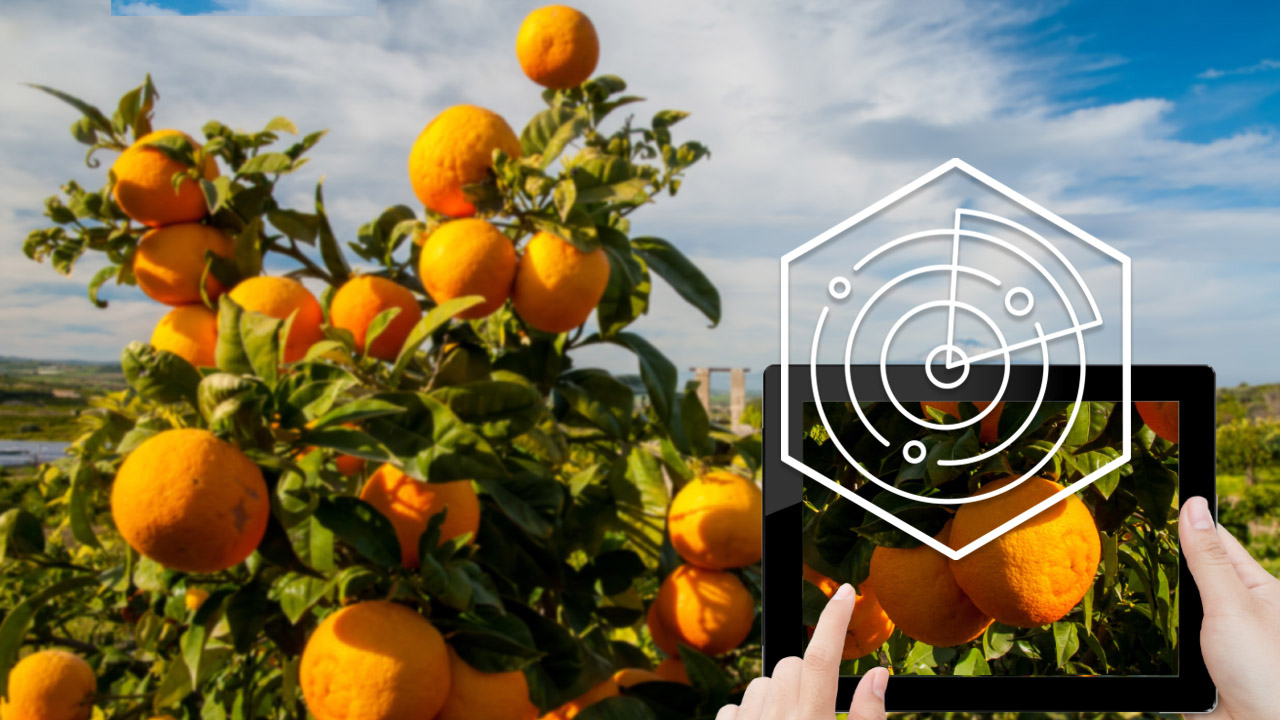Home / Digital Change / Agriculture / ROUGE, the hi-tech sticker for Sicily's PGI Red Oranges
ROUGE, the hi-tech sticker for Sicily's PGI Red Oranges
ROUGE, the hi-tech sticker for Sicily's PGI Red Oranges

Use Case
Made in Italy citrus farming has a new ally against counterfeiting
In addition to increasingly binding legal requirements, the traceability of agricultural products which safeguard and support the Made in Italy trademark responds to a growing demand for information and trust on the part of consumers.
Italy is Europe's leading producer of protected designation of origin products. In recent years, the trade of counterfeit products has increased exponentially, posing a significant threat to the motor of economic growth while at the same time undermining the implementation of good management practices and the Country's image abroad.
Some figures?
According to the 2017 ICQRF Report, out of more than 50,000 inspections, the ministry's inspectorate, which is in charge of combating food fraud, found:
26,8%
illegal workers
15,7%
irregular products
7,8%
irregular samples
€90 million
sequestered products
5%
of the value of European imports accounted for by the sale of counterfeit products, according to the European Union's intellectual property agency
30%
irregularities found in 7,200 inspections carried out by ministerial wine inspectors
Oranges are one of Sicily’s most celebrated products. They account for more than 50% of the total national production (in 2018, approximately one million tons out of a national total of 1,622 million tons).
In past years, batches of oranges from South Africa have been seized and passed off as PGI Red Oranges.
Counterfeiting and fraud represent a detriment to consumers and a loss for producers and Sicily, a region that now exports to China.
In order to protect the quality and origin of the oranges, the Consortium has decided to implement certain product traceability systems.
ROUGE, an entirely new way to safeguard Sicily’s oranges
Introducing ROUGE: Red Orange Upgrading Green Economy. This is the new ally for safeguarding Sicilian citrus farming, designed by Almaviva with the PGI Red Orange Consortium and dedicated to offering product protection services and consumer safeguards to member companies.
The project brings together four important entities: CREA, a research organization that gathers production data; the University of Catania, which creates economic models based on data collected in the field in order to support production decisions; the Consortium, which, thanks to these tools, can verify the origin of products and trace their journey; and Almaviva as the technological partner.
The digital innovation of Almaviva blockchain solution ensures traceability of a product’s identity and history within an international ecosystem.
The ROUGE project's supply chain is further extended through the business agreement between PGI Red Orange, Beske China, and Adm-EA Consulting in order to take advantage of opportunities in global markets and effectively support the Made in Italy brand.
A full product history on your smartphone thanks to Blockchain-based technology
The traceability platform works using blockchain technology, a system that has already been pioneered by Almaviva in order to track production in the wine industry.
In the case of oranges, the system is based on the interaction between the portal used by the Consortium, which displays the data from the various sources that monitor the entire PGI Red Orange segment, and a smartphone app for consumers, which provides information about the entire supply chain.
The digital sticker for oranges, monitored from farm to table
Through a TAG/NFC sticker affixed to the fruit crate, the app allows users to monitor the production field thanks to a geo-localization system associated with the map provided by a public source, the date of harvest, and the storage and distribution method. The unique NFC tag securely connects to the entire history of PGI Red Oranges.
The hi-tech sticker connected to the blockchain system ensures, on the one hand, absolute recognizability of the data, based on information provided by public administration and companies associated with the Consortium, and, on the other hand, the right connection to the product’s certified and immutable history.
The use of NFC and RFID technologies helps people to become informed and conscientious consumers. Through the use of smart labels, everyone can learn about the history of these oranges and the characteristics that make them so unique.
What are the main benefits?
Suppression of counterfeiting
Simplification of bureaucratic requirements
Reduction of data input errors
Improved inspection operations
Monitoring of the sector by the administration
Opportunity to promote products in international markets
Industry 5.0 for Agrifood. And beyond.
With minimal impact in terms of architecture and process flow, Almaviva traceability platform can be applied to all Made in Italy food and non-food products. From Bronte pistachios to high-end fashion.
What’s the next step? Expanding the concept of full traceability in the agricultural world by creating a Supply Chain Management 5.0 platform
In fact, the same methodology can be applied to other industrial markets in order to track, for example, the origin of raw materials, the certification, testing, and maintenance processes of industrial equipment and systems, and even the life cycle of spare parts. With such a system, mechanical enterprises would, on the one hand, acquire more efficiency and control, and, on the other hand, potentially become producers themselves of tools which support the new 5.0 industries, for example by creating machinery that facilitates the reading and writing of smart tags that communicate with new decentralized Web 3 paradigms, i.e.: Blockchain-ready equipment. These are all activities which are part of the National Industry 4.0 Plan.


